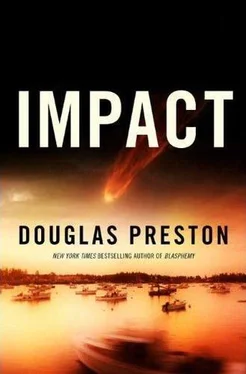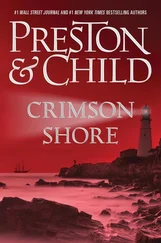Abbey shook her head. "I just keep thinking about what you said, how I've fucked up my life, dropping out of college. My father saved up for years to pay my tuition. Here I am, twenty years old, living at home and waitressing in Damariscotta. Loser."
"Cut it out, Abbey."
"I owe eight thousand dollars, and my father still has to pay."
"Eight thousand? Wow. I didn't know that."
"My father gets up at three thirty to set his traps, works like a dog. He raised me himself after Mom died. And here I am, stealing his boat. Why am I such a despicable daughter?"
"Parents are supposed to work their fingers to the bone for their kids. That's their job." Jackie tried to laugh. "Whoops, here we are."
Abbey looked over her shoulder. The dark shape of the island rose up behind them. There was no beach, just seaweed-covered rocks in the mist.
"Prepare to get wet," said Abbey.
The boat bumped into the closest flat rock and Abbey maneuvered it around sideways, got out, and held the painter. The swell swirled up around her legs and fell while she braced herself. Jackie tossed out the pick, shovel, and backpack and climbed out. They pulled the boat up and looked around.
It was a wild scene of desolation. A massive jumble of split granite boulders rose up before them, jammed with shattered tree trunks, wrecked fishing gear, broken buoys, and frayed rope. The rocks were white with seagull guano and above them, invisible birds wheeled and cried in angry protest.
Abbey shouldered the pack. They scrambled over the fringing scree of flotsam and climbed up the sloping rocks, finally reaching the edge of a saw grass meadow. The island angled upward toward the tip of the bluff, capped by a giant wedge of broken granite like a dolmen, deposited by the glaciers. The saw grass gave way to gooseberry bushes and wind-screwed bayberry. They reached the granite slab and walked past it, toward the bluff end of the island.
On the far side of the slab, Abbey halted, staring. "Oh my God."
In front of her was a fresh crater, five feet in diameter.
28
Ford followed the soldiers down the trail and found the mining camp a scene of chaos, the dust rising, soldiers fleeing and miners milling about, shocked and confused, unable to comprehend what was happening. Others, including entire families, were running, hobbling, or limping away into the forest, some carrying or helping along their sick.
Looking about for Khon, he finally spied the familiar round figure jogging down from the edge of the forest, carrying a pack. He caught up to Ford, heaving, his face coated with sweat. "Mr. Mandrake! Greetings."
"Nice work, Khon." Ford unzipped the pack, pulled out a handheld RadMeter. He switched it on, took a reading. "Forty millirems per hour. Not bad."
Khon looked at the bloodstains on Ford's shirt. "What'd they do to you?"
"You were a little late with the fireworks, my friend. Almost too late."
"I had a bit of trouble stealing the dynamite from the shed. I only had time to reach the closest hill."
"How'd you handle the soldier who came to inspect?"
"I figured they might do that. I divided the charge and set a second one as a booby trap. Poor fellow."
"Clever." Ford pulled a digital camera and GPS out of the pack. He tossed the GPS to Khon. "You mark waypoints. I'm taking pictures."
"Right, boss."
Ford approached the mouth of the mine shaft, holding out the RadMeter. It was a clearly an impact crater, layers of ejecta sprayed out in a radial pattern, all brecciated rock and shatter cones.
"Eighty millirems," Ford said. "It's still fairly low up here. We can stand an hour of this at least before we have to worry."
He cautiously peered into the pit. The crater sloped inward ever steeper, turning into a vertical shaft of about ten feet in diameter with walls of fused glasslike material. Lights were strung on wires attached to the sides of the shaft, with two sets of bamboo ladders going down to what appeared to be a gem-bearing layer. The generator powering the electricity was still running in a nearby shed. A massive scaffolding of bamboo above the pit supported a winch and cargo net for raising and lowering equipment.
Ford stared into the hole, increasingly mystified. It was an incredibly deep crater--bottomless, it seemed--as if the impactor had just kept right on going. He took some pictures of the shaft, then finished up with a panoramic set of pictures all around, three hundred and sixty degrees. He took a set of readings from the RadMeter at fixed distances.
Khon soon returned with the GPS. "All done."
The camp was now almost completely deserted, except dead bodies scattered about.
"Let's blow up this pop stand before our friends realize they've been conned," said Ford. "Because if we don't, they'll be back. And this will start over again." He felt sick with anger looking at the dead bodies strewn about. Some were not even dead, trying to crawl away.
Ford and Khon busted open the doors of the dynamite shed and loaded crates of dynamite onto the abandoned mule cart, along with detonators, timers, and wire. They hauled the dynamite to the mine and stacked the crates onto the cargo net, spread on the ground. Ford plugged each crate with a detonator and wired them all to a timer and a backup.
Ford set the timer. "Thirty minutes."
Working the electric winch, they lifted the net, swung it out over the mouth of the pit, and lowered it down about a hundred feet, playing out the detonator wires as it went. They rested the improvised bomb on the bamboo platform. Ford disabled the motorized winch by knocking off the terminal with a metal bar and ripping out some wires.
"Twenty-five minutes," Ford said, checking his watch. "Let's get the hell out of here."
They jogged toward the wall of jungle and kept going, soon picking up the old trail they had come in on. As they ran, they passed ragged groups of slow-moving villagers. Nobody paid any attention to them. The soldiers had vanished.
"It's close," said Ford, feeling an almost unbearable knot in his stomach. He had never in his life experienced a more hellish scene of human misery, cruelty, and exploitation. What was it in the Cambodian national character that allowed a genuinely kind, gentle, and considerate people, of strong Buddhist faith, to descend to these depths?
They paused, resting on a boulder in the dry streambed. The explosion came right on schedule.
29
Randall Worth cut the engine and drifted in the fog, staring at his radar. The bright blob on the screen, a few hundred yards due south, must be the Marea . Beyond it a smear of green represented Shark Island.
Shark Island. Eight miles out to sea, no harbor, surrounded by reefs, impossible to land on except in a dead calm. A perfect treasure island. Why hadn't he thought of it himself?
He dropped anchor, taking care not to rattle the chain. When it was set, he began loading up his backpack. In went a small portable toolbox, wire cutters, baling wire, duct tape, a knife, the RG .44 Mag, and a box of Winchester hollow-points.
He settled back to wait, listening into the fog. The island was about four hundred yards off and the fog dampened any sound. He could hear nothing. He felt his heart pounding and he tried to ignore that crawling sensation under the surface of his skin, the crank bugs. Not yet, not now. He had to keep his head clear.
Then he heard something: a faint shout. He leaned forward. The shout was followed by a faint but distinct series of whoops, then cheering. Cheering .
He sat up, his heart pounding. Those were the sounds of triumph. They'd found it. Unfuckingbelievable . He grabbed the backpack, tossed it in the dinghy, leapt in after it, pushed off, and began rowing like hell for the Marea . There was almost no sea and the fog was a lucky break.
Читать дальше












